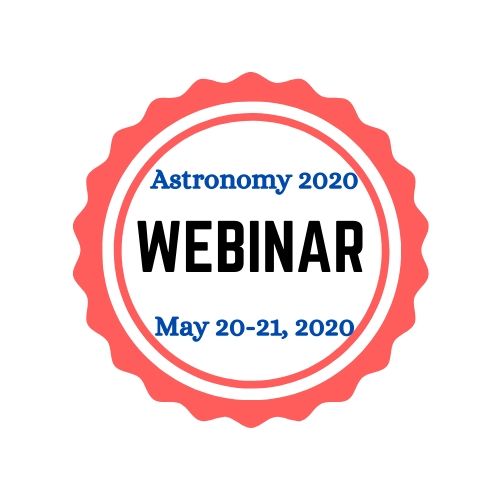About Conference
Conference Series LLC Ltd is bringing forth Astronomy Conference in 2020. We organize Physics Meetings in the fields related to Astronomy, Astrophysics, Space Science, Cosmology, High Energy Physics, Nuclear Physics, Atomic and Molecular Physics, Quantum Physics, Computational Physics, Condensed Matter Physics, Applied Physics, Medical Physics, Optics, etc.
After successful completion of Physics conferences 2019 all over the world, Conference Series wanted to proceed with its Physics meeting.
On this well suited event, Conference Series welcomes the members from everywhere throughout the globe to partake in the 4th International Conference on Astronomy and Space Technology during May 20-21, 2020.
Astronomy 2020 is trending under the theme “Astronomy and Space Technology in the time of Covid-19†which brings together leading scientists, professors, engineers, researchers, scholars, students and market leaders from all areas of Physics, Chemistry, Mathematics, Computer Science, Geology and Biology etc.
Importance & Scope:
Astronomy is one of the oldest fields of science. It deals with the study of Universe and of the objects like sun, moon, stars, planets, comets, gas, galaxies, gas, dust and other non-earthy bodies. It is also a multidisciplinary subject that deals with the study of science with physics, chemistry, mathematics, computer science, geology and biology. Astronomy is necessarily an observational science rather than an experimental one. The discussions and interpretation of observations employ the use of mathematical analysis, often of the most advanced type.
The remarkable development in space technology and its application during the last three decades have firmly established its immense potential for the development of the human society as a whole.
Space platforms are now being extensively used for reaching global communication even into remote rural areas, for worldwide monitoring of weather and for conservation, monitoring and management of natural resources thus significantly contributing to the development of human society.
With the rapid progress achieved, the remote sensing applications now cover diverse fields such as the agricultural crop acreage and yield estimation, drought warning and assessment, flood control and damage assessment, land use/land cover mapping, wasteland management, urban development, mineral prospecting, forest survey, etc.
Why to attend?
-
To network
-
To expand your knowledge and find solutions to problems
-
To present your ideas and work to others
-
For people to meet you
-
Learn beyond your field or interest
Young Scientist Benefits
-
Our conferences provide best Platform for your research through oral presentations.
-
Share the ideas with both eminent researchers and mentors.
-
Young Scientist Award reorganization certificate and memento to the winners
-
Young Scientists will get appropriate and timely information by this Forum.
-
Platform for collaboration among young researchers for better development
-
Award should motivate participants to strive to realize their full potential which could in turn be beneficial to the field as whole.
Deadline for Registrations:
-
Till March 28, 2020 – $399
-
Till April 28, 2020 – $499
-
Till May 17, 2020 – $599
Target Audience
|
Aerospace engineer
|
Photographer
|
|
Analyst
|
Planetarium director
|
|
Astronomer
|
Policy analyst
|
|
Astrophysicist
|
Professor
|
|
Climatologist
|
Programmer
|
|
Chemical engineer
|
Physicist
|
|
Computer systems analyst
|
Research assistant
|
|
Data analyst
|
Research scientist
|
|
Design engineer
|
Science writer/journalist
|
|
Electrical engineer
|
Software developer
|
|
Engineer
|
Software engineer
|
|
Geophysicist
|
Statistician
|
|
Industrial engineer
|
Students
|
|
Instrument designer
|
Telescope engineer
|
|
Laboratory technician
|
Telescope operator
|
|
Mathematician
|
Theoretical astrophysicist
|
|
Mechanical engineer
|
Others
|
|
Observatory manager
|
Â
Â
Sessions/Tracks
Track 1: Astrophysics
Astrophysics is the branch of astronomy that deals with the physics of the universe, especially with “the nature of the heavenly bodies, rather than their positions or motions in spaceâ€. Among the objects studied are galaxies, stars, planets, extrasolar planets, the interstellar medium and the cosmic microwave background. Their emissions are examined across all parts of the electromagnetic spectrum, and the properties examined include luminosity, density, temperature, and chemical composition. Because astrophysics is a very broad subject, astrophysicists typically apply many disciplines of physics, including mechanics, electromagnetism, statistical mechanics, thermodynamics, quantum mechanics, relativity, nuclear and particle physics, and atomic and molecular physics.
Related Journals: Annual Review of Astronomy and Astrophysics | Reviews of Geophysics | Living Reviews in Solar Physics | Nature Geoscience | Astronomy and Astrophysics Review | Observatory
Related Conferences: Astronomy Conferences | Physics Meetings 2020 | Space Science Congress | Astrophysics Summit | Space Technology Symposium
Track 2: Astrochemistry
Astrochemistry is the study of the abundance and reactions of molecules in the Universe, and their interaction with radiation. The discipline is an overlap of astronomy and chemistry. The word "astrochemistry" may be applied to both the solar system and the interstellar medium.
Astrochemistry is an interdisciplinary area of knowledge at the intersection between chemistry and astronomy. As a few examples, topics of active research in this area include identifying organic molecules in interstellar space, building models of the chemical reactions that occur in interstellar space, laboratory measurements of astronomically important molecules, searching for Earthlike planets using molecular signatures, and understanding the contributions of interstellar molecules to the chemical origin of life.
Related Journals: Earth System Science Data | Astrophysical Journal, Supplement Series | Bulletin of the American Meteorological Society | Journal of the Meteorological Society of Japan | Astrophysical Journal Letters
Related Conferences: Cosmology Conference 2020 | Universe Symposium | Dark Matter Meetings | Galaxies Conclave 2020 | Asteroids Forum
Track 3: Astrobiology
Astrobiology is the study of life in the universe. The search for life beyond the Earth requires an understanding of life, and the nature of the environments that support it, as well as planetary, planetary system and stellar interactions and processes. To provide this understanding, astrobiology combines the knowledge and techniques from many fields, including astronomy, biology, chemistry, geology, atmospheric science, oceanography and aeronautical engineering.
Related Journals: New Astronomy Reviews | Earth-Science Reviews | Space Science Reviews | Remote Sensing of Environment | Geoscientific Model Development
Related Conferences: Planetary Science Summit | Astrobiology Conference 2020 | Black Holes Seminar | Exoplanets Meeting | Astronomy Education Forum
Track 4: Astrometry
Astrometry is the branch of astronomy that involves precise measurements of the positions and movements of stars and other celestial bodies. The information obtained by astrometric measurements provides information on the kinematics and physical origin of the solar system and our galaxy, the Milky Way.
Related Journals: Cryosphere | Earth and Planetary Science Letters | Geology | Astronomical and Astrophysical Transactions | Astronomical Journal
Related Conferences: Binary Stars Colloquium | Celestial Mechanics Seminar | Earth Meet 2020 | Galaxy Formation Forum | Interstellar Medium Conclave
Track 5: Cosmo Chemistry
Cosmochemistry or chemical cosmology is the study of the chemical composition of matter in the universe and the processes that led to those compositions. This is done primarily through the study of the chemical composition of meteorites and other physical samples. Given that the asteroid parent bodies of meteorites were some of the first solid material to condense from the early solar nebula, cosmochemists are generally, but not exclusively, concerned with the objects contained within the solar system.
Related Journals: IEEE Transactions on Geoscience and Remote Sensing | Astrophysical Journal | Geophysical Research Letters | Astronomy and Astrophysics | Bulgarian Astronomical Journal
Related Conferences: Space Conference 2020 | Mars Seminar | Milky Way Symposium | Robotic Exploration Meeting
Track 6: Cosmology
Cosmology is a branch of astronomy concerned with the studies of the origin and evolution of the universe, from the Big Bang to today and on into the future. It is the scientific study of the origin, evolution, and eventual fate of the universe.
Related Journals: Journal of Advances in Modeling Earth Systems | Geochimica et Cosmochimica Acta | Tectonics | Surveys in Geophysics | Journal of Seismic Exploration
Related Conferences: Space Weather Conference | Star Clusters Forum | Stellar Evolution Meeting | Telescopes Summit 2020 | The Sun Conclave
Track 7: Extragalactic Astronomy
Extragalactic astronomy is the branch of astronomy concerned with objects outside the Milky Way galaxy. In other words, it is the study of all astronomical objects which are not covered by galactic astronomy.
Related Journals: Tunnelling and Underground Space Technology | Physics of the Dark Universe | Publications of the Astronomical Society of Australia | Earth System Dynamics | Geoscience Data Journal
Related Conferences: Uranus Meeting | White Dwarfs Conference 2020 | Archaeoastronomy Summit | Gamma-ray Astronomy Conclave | Jupiter Colloquium
Track 8: Galactic Astronomy
​​Research in the galactic astronomy unit focuses on astrophysical processes in our own Milky Way. It covers topics from planetary atmospheres, through the early evolution of stars and planets, to exoplanets and the late stages of stellar evolution. For example, the physics and chemistry of interstellar and circumstellar matter, and the processes governing the birth and death of stars. Observations across the electromagnetic spectrum, and do theoretical research and magnetohydrodynamical modeling of star-forming gas clouds and stellar outflows.
Related Journals: Acta Astronomica | Hydrology and Earth System Sciences | Journal of Geodesy | Geochemistry, Geophysics, Geosystems | Journal of Geophysical Research
Related Conferences: Astrochemistry Conference 2020Â | Astrometry Meeting | Cosmo Chemistry Symposium | Extragalactic Astronomy Summit | Stellar Astronomy Seminar
Track 9: Orbital Mechanics
Orbital mechanics, also called flight mechanics, is the study of the motions of artificial satellites and space vehicles moving under the influence of forces such as gravity, atmospheric drag, thrust, etc. Orbital mechanics is a modern offshoot of celestial mechanics which is the study of the motions of natural celestial bodies such as the moon and planets.
Related Journals: Global and Planetary Change | Earth and Space Science | Geostandards and Geoanalytical Research | Egyptian Journal of Remote Sensing and Space Science | Astronomy and Computing
Related Conferences: Galactic Astronomy Conclave | Physical Cosmology Forum | Planetary Science Meeting| Solar Astronomy Congress | Space Technologies Seminar
Track 10: Physical Cosmology
Physical cosmology is a branch of cosmology concerned with the studies of the largest-scale structures and dynamics of the universe and with fundamental questions about its origin, structure, evolution, and ultimate fate.
Related Journals: Tectonophysics | Progress in Earth and Planetary Science | Molecular Astrophysics | Journal of High Energy Astrophysics | Astrobiology
Related Conferences: Aerospace Engineering Conference | Space Vehicles Symposium | Planetary Atmospheres Meeting | Planetary Astronomy Seminar | Space Infrastructure Colloquium
Track 11: Planetary Science
Planetary science (rarely planetology) is the scientific study of planets (including Earth), moons, and planetary systems, in particular those of the Solar System and the processes that form them. It studies objects ranging in size from micrometeoroids to gas giants, aiming to determine their composition, dynamics, formation, interrelations and history. It is a strongly interdisciplinary field, originally growing from astronomy and earth science, but which now incorporates many disciplines, including planetary astronomy, planetary geology (together with geochemistry and geophysics), atmospheric science, oceanography, hydrology, theoretical planetary science, glaciology, and the study of extrasolar planets. Allied disciplines include space physics, when concerned with the effects of the Sun on the bodies of the Solar System, and astrobiology.
Related Journals: Earth, Planets and Space | Space Weather | Meteoritics and Planetary Science | International Journal of Earth Sciences | Journal of Astronomical Telescopes, Instruments, and Systems
Related Conferences: X-ray Astronomy Conference | Star Formation Symposium | Solar System Seminar | Neutron Stars Meeting | Cepheid’s Forum
Track 12: Solar Astronomy
The Sun, or Sol, is the star at the center of the Solar System. It is a nearly perfect sphere of hot plasma, with internal convective motion that generates a magnetic field via a dynamo process.
Related Journals: Physics of the Earth and Planetary Interiors | Frontiers in Earth Science | Solar Physics | Canadian Journal of Remote Sensing | Planetary and Space Science | Astronomy and Geophysics
Related Conferences: Comets Meeting | Infrared Astronomy Conference | Planet Formation Seminar | Space Exploration Symposium | The Moon Colloquium
Track 13: Stellar Astronomy
Stellar astronomy is the study of the sun and the stars: what they are, how they move, and how they are born, live, and die. The major challenge of this field is the staggering distance to even the closest stars. Scientists had great difficulty understanding stars without being able to touch them and experiment upon them. This difficulty required radical, creative thinking and a constant willingness to embrace new ideas and techniques.
Related Journals: Revista Mexicana de Astronomia y Astrofisica | Journal of the Korean Astronomical Society | Science China Earth Sciences | Geotectonics | Astrophysical Journal, Supplement Series
Related Conferences: Ultraviolet Astronomy Conference | Stars Meeting | Astronomy Congress 2020 | Cosmology Summit | Space Technology Conference
Track 14: Space Technologies
Space technology is technology developed by space science or the aerospace industry for use in spaceflight, satellites, or space exploration. Space technology includes spacecraft, satellites, space stations, and support infrastructure, equipment, and procedures. Space is such a novel environment that attempting to work in it requires new tools and techniques. Many common everyday services such as weather forecasting, remote sensing, GPS systems, satellite television, and some long-distance communications systems critically rely on space infrastructure.
Related Journals: Nature Astronomy | Astroparticle Physics | Journal of Astronomical Instrumentation | Celestial Mechanics and Dynamical Astronomy | Research in Astronomy and Astrophysics
Related Conferences: Astronomy Conferences | Physics Meetings 2020 | Space Science Congress | Astrophysics Summit | Space Technology Symposium
Track 15: Aerospace Engineering
Aerospace engineering is the primary field of engineering concerned with the development of aircraft and spacecraft. It has two major and overlapping branches: aeronautical engineering and astronautical engineering. Avionics engineering is similar, but deals with the electronics side of aerospace engineering.
Related Journals: Advances in Astronomy | General Relativity and Gravitation | Galaxies | Experimental Astronomy | Vacuum | Indian Journal of Radio and Space Physics
Related Conferences: Cosmology Conference 2020 | Universe Symposium | Dark Matter Meetings | Galaxies Conclave 2020 | Asteroids Forum
Track 16: Space Weather
Space weather refers to the environmental conditions in Earth's magnetosphere, ionosphere and thermosphere due to the Sun and the solar wind that can influence the functioning and reliability of space borne and ground-based systems and services or endanger property or human health.
Space weather deals with phenomena involving ambient plasma, magnetic fields, radiation, particle flows in space and how these phenomena may influence man-made systems. In addition to the Sun, non-solar sources such as galactic cosmic rays can be considered as space weather since they alter space environment conditions near the Earth.
Related Journals: International Journal of Astrobiology | New Astronomy | Life Sciences in Space Research | Astrophysics and Space Science | Astronomy Reports
Related Conferences: Space Conference 2020 | Mars Seminar | Milky Way Symposium | Robotic Exploration Meeting
Track 17: Electromagnetic Radiation
Electromagnetic radiation is a form of energy that is all around us and takes many forms, such as radio waves, microwaves, X-rays and gamma rays. Sunlight is also a form of EM energy, but visible light is only a small portion of the EM spectrum, which contains a broad range of electromagnetic wavelengths.
Related Journals: Contributions of the Astronomical Observatory Skalnate Pleso | Astrophysical Bulletin | Journal of Astronomy and Space Science | New Space | Bulgarian Chinese Astronomy and Astrophysics
Related Conferences: Planetary Science Summit | Astrobiology Conference 2020 | Black Holes Seminar | Exoplanets Meeting | Astronomy Education Forum
Â
Â
In addition to Sessions/Tracks, papers dealing with new areas of science and technology that fit the broad scope and objectives of the Conference are encouraged.
Key Dates/Deadlines
Abstract Submission: Now Opens
Registration: Now opens
Deadline for Abstract submission: Â For Oral & Poster May 12, 2020
Deadline for Registration:Â May 17, 2020
Â
Market Analysis
According to latest report, Prospects for Space Exploration, global government investment in space exploration totaled $14.6 billion in 2017, a 6% increase compared to 2016. Fifteen leading space programs worldwide are estimated to contribute to this global investment, with the U.S. accounting for 74% of the total. Global expenditures have grown in the past five years driven by programs in leading countries and new countries investing in space exploration. In a still constrained budgetary environment, global space budgets for space exploration are expected to grow to over $20 billion by 2027.
At $7.7 billion in 2017, transportation is the largest expenditure area; it is forecasted to reach nearly $9 billion in 2027 supported by significant investments from multiple countries and particularly in the U.S. and China to support the development of next generation crew and/or cargo vehicles for LEO and beyond-LEO activities.

Orbital Infrastructure is the second-largest application with $3.5 billion in 2017, an investment which has been stable over the past five years. Funding should continue to grow, driven by investments in the ISS program and increasing funding for the development of the Lunar Orbital Platform-Gateway by ISS partners as well as China’s investment in its space station.
Moon exploration, which has received modest investment in the past five years, should experience sustained growth, reaching $2.8 billion by 2027 to support ambitious government missions and commercial partnership programs as Moon exploration becomes a central item in the exploration strategy of most agencies moving forward.
Mars exploration budgets grew to $1.5 billion in 2017; investment is expected to peak in 2018 as four missions are set for launch in 2020. After a cyclical downturn, new investment cycles to support planned missions might increase funding again to reach $1.3 billion in 2027.
Other deep space exploration programs reached $1.4 billion in 2017; global funding should reach $1.8 billion by 2021 to support the development of multiple planned missions in the middle and end of the decade.
Over the past ten years, 19 planetary exploration missions were launched by six countries/agencies (the U.S., ESA, Russia, Japan, China, and India). Over the next decade nearly 80 missions are expected to be launched, of which 63% will correspond to government missions. The next decade will also see the rise of commercial exploration initiatives, with close to 30 commercial missions forecasted by 2027, primarily driven by lunar initiatives. In terms of application, Moon exploration is expected to account for the majority of missions (64% of the total) to be launched by 2027, as lunar exploration becomes the focus in the strategy of private and public stakeholders. A total of 18 missions are anticipated to be launched for other deep space exploration, while the remaining missions will be dedicated to Mars exploration.
Related Socities and Associations
Europe
European Association for Astronomy Education | Société astronomique de France | Astronomische Gesellschaft | Unione Astrofili Italiani | Polish Astronomical Society | Airdrie Astronomical Association | Astronomical Society of Glasgow | Astronomy Centre | British Astronomical Association | Crayford Manor House Astronomical Society | Federation of Astronomical Societies | Liverpool Astronomical Society | Manchester Astronomical Society | Mexborough & Swinton Astronomical Society | Northumberland Astronomical Society | Nottingham Astronomical Society | Royal Astronomical Society | Society for Popular Astronomy | Society for the History of Astronomy
America
Canadian Astronomical Society | Royal Astronomical Society of Canada | Amateur Astronomers Association of Pittsburgh | American Association of Variable Star Observers | American Astronomical Society | American Meteor Society | Association of Lunar and Planetary Observers | Astronomical League | Astronomical Society of the Pacific | Birmingham Astronomical Society | Escambia Amateur Astronomers Association | Echo Ridge Astronomical Society | Indiana Astronomical Society | Kaua‘i Educational Association for Science and Astronomy | Kopernik Astronomical Society | Louisville Astronomical Society | Milwaukee Astronomical Society | Mohawk Valley Astronomical Society | Northern Virginia Astronomy Club | Southern Cross Astronomical Society | Shreveport-Bossier Astronomical Society | SETI Institute | Sociedade Astronômica Brasileira | Nibiru Sociedad Astronomica
Asia, Africa & Oceania
Korean Astronomical Society | Astronomical Society of India | Confederation of Indian Amateur Astronomers | Jyotirvidya Parisanstha | Khagol Vishwa | Khagol Mandal | IUCAA | Vratino Astronomer Club | Astronomical Society of Southern Africa | Nepal Astronomical Sciety (NASO) | Pokhara Astronomical Society (PAS) | Pakistan Amateur Astronomers Society | Cyprus Astronomy Organisation | Astronomical Society RuÄ‘er Bošković | Spaceturk | Astronomical Society of Australia | Astronomical Society of New South Wales | Astronomical Society of South Australia | Astronomical Society of Victoria | Macarthur Astronomical Society | Mornington Peninsula Astronomical Society | Sutherland Astronomical Society | Whakatane Astronomical Society | Dunedin Astronomical Society | Royal Astronomical Society of New Zealand
Past Conference Report
Astronomy 2019
3rd International Conference on Astronomy and Space Science was hosted by the Conference Series LLC Ltd at London, UK during May 02 -03, 2019 with the theme “Exploring the Energetic Universeâ€.
The conference marked its start by an opening ceremony which included introduction by the Honorable Guests and the Members of Keynote Forum. All the speakers have extended their contribution in the form of highly informative presentations to lead the conference to the ladder of success.
Conference Series extends its warm gratitude towards all the Participants, Eminent Speakers, Young Researchers, Delegates and Students.
We would like to specially thank the following people who laid the foundation for the event’s success.
Organizing Committee Members:
Christopher Terence John Dodson Professor, University of Manchester, UK
Robert Y. George President & CEO, George Institute for Biodiversity & Sustainabilty, USA
David A Harrison Business Development Manager, Materion Precision Optics, USA
Susan McKenna-Lawlor Founder of Space Technology Ireland, Maynooth Universtiy, Ireland
Grant J. Mathews Professor, University of Notre Dame, USA
Qiu He Peng Professor, Nanjing University, China
Lukasz Andrzej Glinka Editor-in-Chief, Member of the American Association of International Researchers, USA
Dimitris Drikakis Professor, University of Strathclyde, UK; M.A.K. Lodhi Professor, Texas Tech University, USA
Sachiko Tsuruta Professor, Montana State University, USA
Nikolaos K. Spyrou Professor, Aristotle University of Thessaloniki, Greece
Â
Keynote Speakers:
Christopher Terence John Dodson, University of Manchester, UK
Eija I Tanskanen, Aalto University, Finland
Qiu-He Peng, Nanjing University, China
Artur Martirosyan, Institute for Physical Research, Republic of Armenia
After the huge optimistic response from scientific fraternity, renowned personalities and the Editorial Board Members of Conference Series from across the world. We are pleased to announce the 4th International Conference on Astronomy and Space Technology to be held during May 20-21, 2020.
Â
Let us meet again @ Astronomy 2020
Â
Past Reports Gallery


















